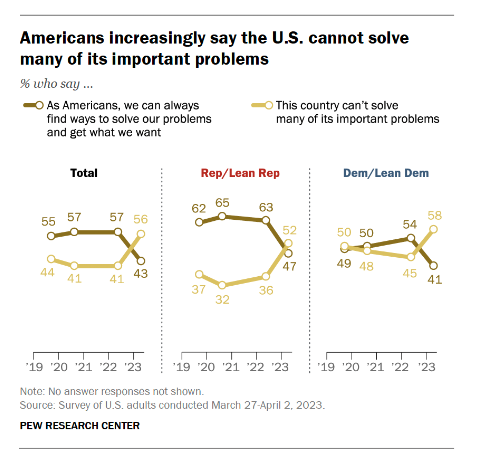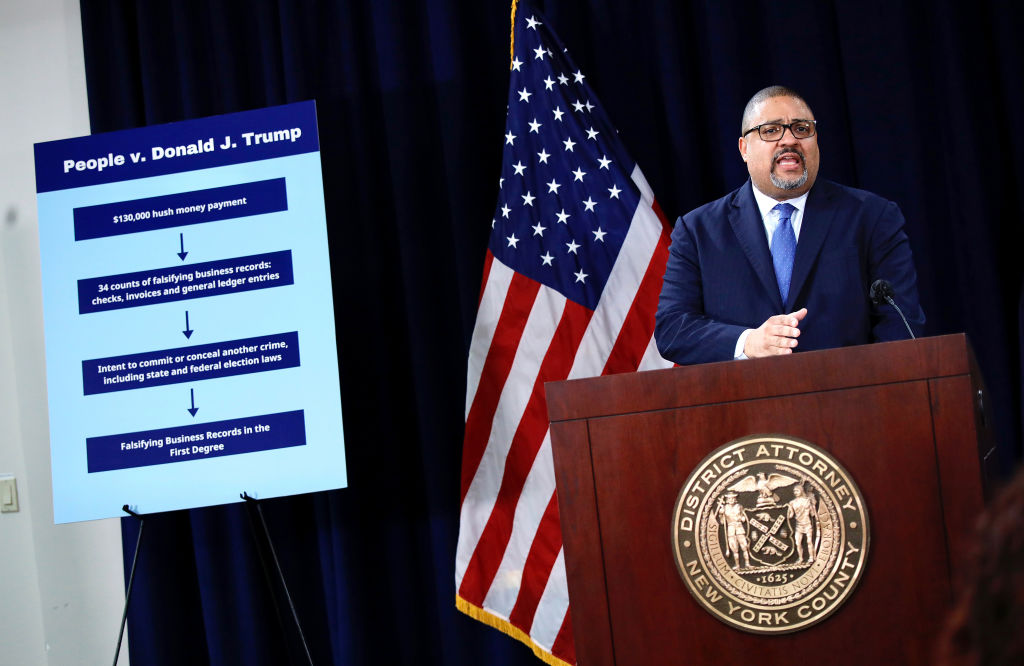When people suffer as a result of doing something foolish, like being hospitalized after seeking the healing power of “raw water” or having to be saved by a rescue crew after choosing a tidal cave for do-it-yourself porn pictures, we are first tempted to say, “Ah, drugs …”
But people do amazingly dumb things all the time without the aid of any chemical enhancements—like, for instance, Democrats choosing the city of Chicago as the host for its 2024 convention. One assumes that the members of the Democratic National Committee were not under the influence of anything stronger than statins and maybe some legal ganja when they picked the troubled city for their gathering.
Yes, the most powerful mind-altering agent in politics remains self-deception. Democrats going to a city that is infamous for street crime and soon to be under the mayoralty of a progressive favorite who is already facing pushback from the police and business leaders would be like Republicans holding their convention at Mar-a-Lago. (Not that I would put it past them …) The first rule of a nominating convention, especially when your party is incumbent, is to make no trouble. So why on earth go to Chicago?
Since the idea popped up a year ago, Democrats have a lot less to worry about when it comes to how the convention itself will go. Back then, before the reasendence of Donald Trump on the Republican side and the GOP’s corresponding bungle of the 2022 midterms, President Joe Biden had a much more tenuous hold on his party. But as summer approaches, the chances for a robust primary challenge to Biden are dwindling, and along with them, the possibility for disruption inside the convention itself. It may yet be chaos rather than a coronation, but for now, the odds are decidedly better for Biden.
But the point of such a convention, we are told over and over again, is “messaging.” It is a chance to tell persuadable voters what the party is all about, right? So what’s the message Democrats are hoping to send from Chicago? An emphasis on the Midwest, apparently. But this sounds like motivated reasoning to explain a decision more easily understood in terms of power: Chicago and Illinois are very powerful in Democratic politics while runner-up Atlanta and its state of Georgia are not. Illinois’ billionaire Democratic governor, J. B. Pritzker, even went so far as to personally guarantee to cover any cost overruns for the party if it brought the event to his hometown. Atlanta would have been a better pick, but lacked the intraparty juice.
The problem with political conventions is that they don’t do what they’re supposed to do and they can’t do what their organizers want them to.
What conventions are supposed to do is choose a nominee, and, ideally, unite the party around that candidate as they head off into the general election. But in every contest since the dawning of the era of primary elections more than 40 years ago, the nominees have been decided in advance of the convention. The gathering ends up being a trade show for the very weird business of politics and an opportunity for the airing of grievances. It’s like a wedding for a couple that’s already been living together for a decade where the bride’s family keeps hitting the groom a little too hard in the toasts.
What parties want them to be are infomercials for their candidates, particularly to persuadable voters. But conventions are, by definition, about internal politics. Mostly stripped of their original purpose of choosing candidates, conventions have become opportunities to exercise power and show status-—ven if that exercise will put the nominee in the wrong town for showing that the party is ready to get serious on crime, the issue that may end up being their greatest weakness with persuadable voters.
Holy croakano! We welcome your feedback, so please email us with your tips, corrections, reactions, amplifications, etc. at STIREWALTISMS@THEDISPATCH.COM. If you’d like to be considered for publication, please include your real name and hometown. If you don’t want your comments to be made public, please specify.
STATSHOT
Biden Job Performance
Average approval: 41.4%
Average disapproval: 54.0%
Net score: -12.6 points
Change from one week ago: Unchanged
Change from one month ago: ↓ 4.8 points
[Average includes: Quinnipiac: 38% approve-57% disapprove; Fox News: 44% approve-56% disapprove; NPR/PBS/Marist: 43% approve-50% disapprove; Gallup: 40% approve-56% disapprove; Monmouth: 42% approve-51% disapprove]
Polling Roulette

TIME OUT: FROG, BY ANNE FADIMAN
Harpers: “There are two kinds of pets—the ones you choose and the ones that happen to you. Bunky belonged to the second category. He entered our family in the haphazard fashion of pets of that ilk: tadpole kit (cubical plastic ‘habitat’ with domed top, like nave of Hagia Sophia, sans tadpole but accompanied by redeemable coupon), left by educational-toy-oriented grandmother for granddaughter under Christmas tree; kit sidelined for years on toy shelf; kit discovered by granddaughter’s preschool-age little brother; tadpole coveted; tadpole coupon redeemed by parents; tadpole shipped to New York City from Florida in Styrofoam container; tadpole universally admired … ; froglet admired somewhat less; adult frog mostly ignored, except by visiting small boys, who, if they didn’t have frogs themselves, paused to pay brief homage before moving on to Legos, and by owner’s father, who, despite initial intentions to teach son responsibility through pet care, ended up feeding frog … and, once frog graduated from Hagia Sophia, cleaning aquarium, first two-gallon plastic, then four-gallon glass (challenging, because frog, coated with gelatinous goo, required apprehension and temporary relocation while aquarium was emptied, refilled, and doctored with dechlorinating crystals, and damn, was he slippery).”
SCOTT ELBOWS INTO GOP FIELD
New York Times: “Senator Tim Scott of South Carolina, the most prominent Black leader in the Republican Party, started an exploratory committee for a 2024 presidential run on Wednesday. … Mr. Scott said his decision to form the committee was born out of the weeks he had spent touring early primary states, including Iowa, New Hampshire and his home state, South Carolina. … An exploratory committee will allow the senator, who would enter the Republican primary with nearly $21.8 million on hand in his Senate account, to raise money directly for a 2024 campaign and garner more national attention before a formal presidential announcement. … If and when Mr. Scott officially enters the race, he will be the second South Carolina Republican in the 2024 sweepstakes, following the entry of Nikki Haley, the former governor and former United Nations ambassador.”
Palmetto rivalry ratchets up after Scott announcement: Washington Post: “Haley and Scott are each trying to position themselves as the GOP’s heir apparent: a more youthful contender who can lure back voters who were repelled by Trump’s polarizing style and penchant for chaos. … The two South Carolina natives are also competing in overlapping donor networks and among a limited pool of voters — even as they adopt different strategies for facing off against Trump. … Scott on Wednesday avoided even uttering the former president’s name… Haley has been more pointed — though still cautious — as she contrasts her record against those of Trump and DeSantis.”
DeSantis PAC looks to shore up slipping numbers: Wall Street Journal: “The former president has enjoyed a bump in GOP support since his indictment in New York on hush-money charges, as many Republicans rally to his side. But Mr. DeSantis is making an implicit argument within the party that Mr. Trump is incapable of winning a general election and trying to appeal to those tired of constant turmoil. The governor’s team is seeking to reassure Republican leaders and donors that there is a long campaign ahead, as the first primaries are still nine months away. … A group supporting his campaign will launch a seven-figure television ad that portrays the governor as a leader of a movement surrounding his rejection of Covid-19 lockdowns, support for parental rights in education and fights over the ‘woke left.’ … A FiveThirtyEight average of national polls of Republicans shows Mr. Trump receiving 49% of the vote and Mr. DeSantis 26%, a wider average lead than Mr. Trump had a month ago.”
Abortion stumps GOP hopefuls: Semafor: “Republicans are trapped in a machine they switched on, but can’t switch off. Abortion remains a front-of-mind issue for voters, with no clarity on what the leading Republican candidates for presidents would do about it if elected. … The problem, for those candidates, is that the issue’s moving on three separate tracks. In federal courts, thanks to Trump-era appointments, conservatives have judges and majorities who’ll approve maximalist restrictions. … In federal politics, that dithering has intensified. Republican presidential candidates are mostly avoiding the topic for now, but will face pressure to win over anti-abortion evangelical voters in Iowa and South Carolina with tougher stances and more specifics. … What would a new, pro-life Republican president do, when handed control of the federal government for the first time in the post-Roe era? It’s a legitimate question, and the movement will keep asking it.”
Judicial record earns Trump support with Iowa evangelicals: AP: “That history repelled many Iowa evangelical leaders during the last competitive Republican caucuses in 2016, when they helped push Texas Sen. Ted Cruz to victory in the opening contest. As the 2024 campaign begins, however, many of those same leaders are open to Trump, grateful for his judicial appointments that resulted in the dismantling of a constitutional right to abortion. … ‘I believe, and I think many evangelical Christians understand, politics at that level is a blood sport. Donald Trump is fighting. That’s why he got things done,’ said the Rev. Terry Amann of suburban Des Moines. ‘So, our role isn’t to judge him.’ … The evangelical support reflects a broader dynamic taking hold with the GOP base rallying around Trump in the aftermath of his indictment.”
PRESSURE MOUNTS FOR DIFI DEPARTURE
New York Times: “Senator Dianne Feinstein on Wednesday pushed back on calls for her resignation but asked to step away from the Judiciary Committee indefinitely while recovering from shingles, responding to mounting pressure from Democrats who have publicly vented concerns that she is unable to perform her job. … Her absence has become a problem for Senate Democrats, limiting their ability to move forward with judicial nominations. … ‘We need to put the country ahead of personal loyalty,’ Representative Ro Khanna, Democrat of California, tweeted on Wednesday, calling for her resignation. … Her desire to hang on to her post, despite her health and memory issues, has irked many of her colleagues on the left.”
A boon for Dems, Baldwin will seek reelection: Milwaukee Journal-Sentinel: “Democratic U.S. Sen. Tammy Baldwin on Wednesday said she is running for re-election, officially setting up what is expected to be a high-profile race in Wisconsin as Democrats attempt to maintain their slim control of the Senate in 2024. … A number of Republicans are considering a challenge to Baldwin, though none have yet declared a 2024 bid. … Madison businessman Eric Hovde has said he’s seriously considering a run, and Republicans in the state are quietly hoping U.S. Rep. Mike Gallagher mounts a bid. … Baldwin is a proven fundraiser and is seen in the state as a formidable opponent. She defeated…Leah Vukmir by 11 points in 2018 — large margins in a battleground state accustomed to close finishes.”
Arizona GOP’s first major Senate contender is a MAGA all-star: NYT: “Mark Lamb, a right-wing sheriff and an ally of former President Donald J. Trump known for his policing of elections and his defiance of a pandemic lockdown, announced that he would run for Senate in Arizona next year, a contest that could determine control of the closely divided chamber. Mr. Lamb, 50, became the first high-profile Republican to compete for the seat, one currently held by Senator Kyrsten Sinema, who left the Democratic Party in December to become an independent. Ms. Sinema has not said whether she will run, but if she does, there is already one Democratic challenger: Representative Ruben Gallego, a progressive Democrat from Phoenix. … Mr. Lamb, as the top law enforcement officer in Arizona’s third-most populous county, Pinal, made headlines when he refused to enforce the state’s stay-at-home order in 2020 and then when he expressed sympathy for the rioters who attacked the Capitol on Jan. 6, 2021. He has also sown doubt over the results of the 2020 election.”
Lake, Mastriano weigh Senate runs, too: Washington Post: “In Pennsylvania … former gubernatorial candidate Doug Mastriano is expected to run. And in Arizona, fellow failed gubernatorial candidate and election-truther Kari Lake is taking meetings and saying things that suggest she, too, could get in. … [B]oth Lake and Mastriano could lay significant claim to being among the GOP’s most costly nominees. … And Arizona and Pennsylvania might not even be strictly necessary for the GOP. That’s because the map is favorable; each of the eight seats most likely to flip in 2024 is held by a Democrat. … Republicans could win the Senate simply by flipping seats in red states like Montana, Ohio and West Virginia..”
BRIEFLY
Dems represent wealthiest congressional districts, GOP the poorest—Axios
Double-digit Wisconsin loss highlights GOP’s mail-in voting problem—Politico
Failed candidate Majewski will challenge Kaptur again in 2024—Washington Examiner
WITHIN EARSHOT: WHEN THE BLARNEY HITS YOU
“I come to the job with more experience than any president in American history. Doesn’t make me better or worse. But, gives me a few excuses.”—President Biden in a speech to the Irish Parliament in Dublin discussing his advanced years.
MAILBAG
“If you look at the younger generation in France, Sweden, Finland, Germany, etc., it seems that they are much more inclined to support their respective conservative parties than the younger generation is in the U.S. (who are widely on the liberal side of the spectrum). What do you think is the reason behind this and why does conservatism appeal to younger Europeans more than younger Americans?” —Kaley McConnell, Palo Alto, California
Funny you should ask, Ms. McConnell! I am writing to you from a train zipping through the German countryside at the end of a week of spring break with my oldest manchild. A big chunk of that time was spent in the former East Germany, which is the home to a lot of the right-wing youths of which you speak. I think the first thing to do here is remember the differences between American and European conservatism. In Europe, being conservative has basically one meaning: a preference for traditional modes of living, culture, and government. In Eastern Europe, for example, a conservative might yearn for a return to greater state control of the economy and culture like there was in the communist era. In Western Europe, one might pine for monarchy and state-sponsored religion. In America, the word is a linguistic fork in the road. Down one path is the same kind of emphasis on nationalism, state power, religion, and tradition. But down the other path is a version of what Europeans think of as liberalism: freedom and individual rights. That American conservatism is conserving the nation’s founding and the principles of our Declaration of Independence and Constitution. That’s why I try to differentiate between “nationalists” and “conservatives” on the American right, just as I do with “progressives” and “liberals” on the left. As American conservatism has become more and more European in the past decade and progressives have become increasingly illiberal, these differentiations have become increasingly important. The way for the right wing to capture the youth vote in America as it has in Europe may be to blend culture war with state-planned economics and generous public spending, a sort of MAGA Bernie Bro model. The adoration of Hungarian strongman Viktor Orbán and even Vladimir Putin among some on the American right reflects this movement. But there’s also something much more obvious at work, here: Republicans have had a craptacular run of it lately. A 25 year-old American voter who has been eligible to participate in two presidential elections has only known a party that, even by the admission of its own members, has been going through an ugly, wrenching fight over its values and identity. Younger voters are far more malleable in their partisan identities than their older counterparts, which should be a serious worry for the GOP. Opinions that take root now will be hard to pull out later. But, I would also be wary of overestimating the shift. There is a LOT of foofaraw around the idea of a youthquake in American politics, but it has been said many times before and mostly come up with a little tremor. Consider the claim: “When I started polling young Americans in 2000, they voted 50 D and 50 R. In many states today, the same age cohort votes 75 D and 25 R.” To which I say: ehhhhh. … Note the shift from national numbers to “many states today.” The states are even more sorted and polarized today than they were 23 years ago, so I’m not surprised that yung voters reflect that trend, e.g. more Democratic in California, more Republican in Oklahoma. As I mentioned before, this may have serious long-term consequences for Republicans, particularly if the party is regarded as extreme on issues like abortion and, whodathunkit, drag queens. But younger voters are always disproportionately Democratic. In 2020, 36 percent of voters under 30 went for the Republican candidate. In 2012, it was 37 percent. Those numbers are substantially lower than they were in the 1980s and 1990s,, with the downward trend beginning in 2008 when Democrats nominated a charismatic young candidate and Republicans did not. That’s all a very long way of saying 1) the European right and the American right have been and still are substantially different 2) the chaos and self-loathing in the Republican Party will have a long hangover with voters who have come of age in recent years 3) the phenomenon is almost certainly overstated by Democrats and demographers. Danke. Das ist alles für jetzt. Tschüss!
“I saw in the [Pew Research Center] poll you shared last week that monthly religious participation went down from 61 to 46 percent of black Protestants. That’s by far the biggest dip in the poll. What’s going on? BTW, the Catholics [34 percent said they attended one a month or more] are lying. Our internal data only has 15-20 percent participation based on us counting who actually shows up.”—Ryan Ellis, Alexandria, Virginia
I would first caution you about the dangers of overinterpreting subgroups in surveys like thes, but a nearly 25 percent decrease certainly merits notice. Age is a factor here, but data from the Public Religion Research Institute suggest black Protestants are, on the whole, younger than some other American religious groups with a median age of 50, the same as white mainline Protestants and far younger than white evangelical Protestants. Both of the white groups saw significantly smaller decreases in attendance post-pandemic, 10 percent and 8 percent, respectively. The reticence of older congregants to attend in-person services, and losses of life from the virus account for some of the declines across the board, but we saw higher rates of serious illness and death among black Americans as well as a slower, lower rate of vaccinations. Sadly, that may be part of the disparity. But the number that stands out for me with black Protestants in the Pew poll is the popularity of televised and online services. Twenty-eight percent of black Protestants said they only watched from home compared to 18 percent of Protestants as a whole and 10 percent of Catholics. Is the success of T.D. Jakes and others partly behind the shift? As for your Roman Catholic brothers and sisters, Mr. Ellis, I would suggest that the ubiquity of places of worship and frequency services makes it very easy to pop in once a month, including in school settings, hospitals etc. At least some of the sheep must be slipping past the shepherds’ counts. But I would also guess that since Roman Catholicism places a high premium on attendance, there might be strong unconscious bias among respondents toward overstating the actual frequency of their participation. So, maybe let’s not say “lying,” but rather “optimistic estimation.”
You should email us! Write to STIREWALTISMS@THEDISPATCH.COM with your tips, kudos, criticisms, insights, rediscovered words, wonderful names, recipes and, always, good jokes. Please include your real name—at least first and last—and hometown. Make sure to let me know in the email if you want to keep your submission private. My colleague, the stalwart Nate Moore, and I will look for your emails and then share the most interesting ones and my responses here. Clickety clack!
CUTLINE CONTEST: ON THE LEVEL

Who doesn’t like a sight gag? The photographer’s use of a Dutch angle for a shot of District Attorney Alvin Bragg announcing the criminal charges against former President Donald Trump elicited a few responses—not nearly as many as Bragg’s underwhelming visual aid, but still a good-sized batch. But our winner had the best of the bunch this week by keeping it simple:
“Clearly, the charges are not slanted in any way.” —Bob Goldman, Gilroy, California
Winner, You Never Know What a Balm Will Do Division:
“Lewd, Lascivious, Salacious, Outrageous!”—William Bodie, Chevy Chase, Maryland
Winner, Wocka Wocka Division:
“Nothing to Bragg About.”—Tom Walk, Greensboro, North Carolina
Winner, Yes, Drill Sergeant Division:
“Knife hand!”—Lydia Burgdorf, Omaha, Nebraska
Winner, Schrödinger’s Indictment Division:
“And that leads into Step 3: ‘TOTAL VICTORY!!!’”—Jack Funke, Poplar Bluff, Missouri
Winner, Keep it Kosher Division
“Turns out it’s Passover and there’s no ham sandwich available. So we went for this.”—Nathan Wurtzel, South Riding, Virginia
Send your proposed cutline for the picture that appears at the top of this newsletter to STIREWALTISMS@THEDISPATCH.COM. We will pick the best entrants for each week and an appropriate reward for the best of this month—even beyond the glory and adulation that will surely follow. Be hilarious, don’t be too dirty, and never be cruel. Include your full name and hometown. Have fun!
MAKING THE CASE FOR BREXIT
The Guardian: “A German punk rock band that was refused entry to the UK because of ‘opaque and confusing’ post-Brexit rules may have been turned away at the border because they are not full-time professional musicians and have day jobs. … Trigger Cut, a three-piece from Stuttgart, should have been on a seven-date tour of the UK this week, but were refused entry by UK border guards at Calais last Thursday. …The UK-based music agent Ian Smith … [said] they were refused entry after telling the border officer that they had other jobs back in Germany. … Steve Richard, an immigration consultant who has been helping major record labels bring artists to the UK for more than 30 years, said it was ‘counterproductive’ for UK border agents to refuse Trigger Cut entry. … A bigger problem, he said, was bands from all over the world deciding it was ‘too much faff’ to visit the UK on their European tours.”
Chris Stirewalt is a contributing editor at The Dispatch, a senior fellow at the American Enterprise Institute and the author of Broken News, a new book on media and politics. Nate Moore contributed to this report.







Please note that we at The Dispatch hold ourselves, our work, and our commenters to a higher standard than other places on the internet. We welcome comments that foster genuine debate or discussion—including comments critical of us or our work—but responses that include ad hominem attacks on fellow Dispatch members or are intended to stoke fear and anger may be moderated.
With your membership, you only have the ability to comment on The Morning Dispatch articles. Consider upgrading to join the conversation everywhere.